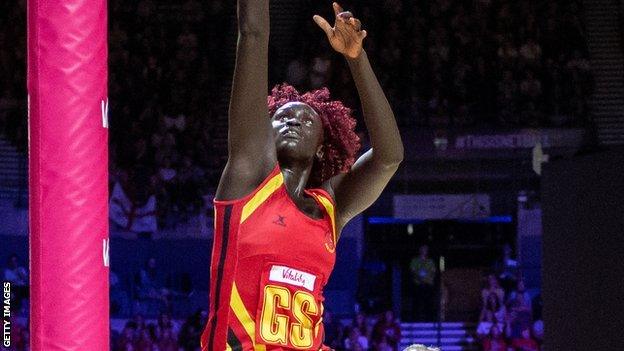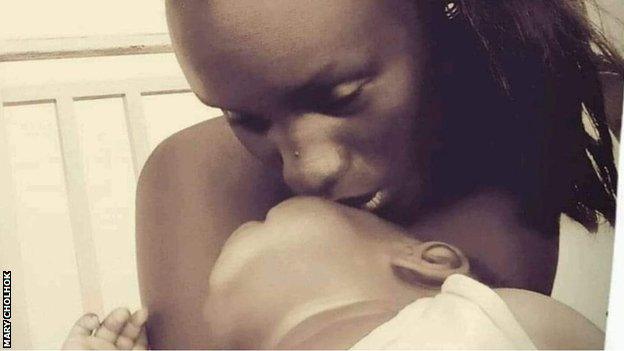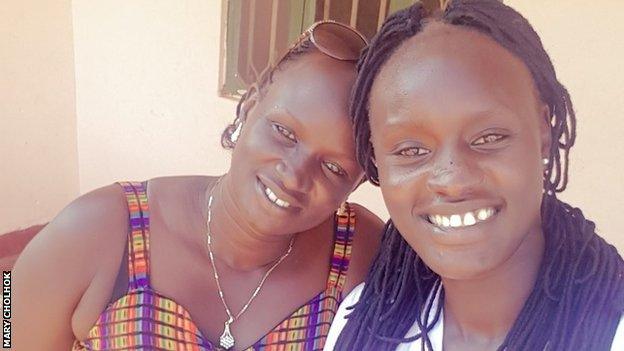Mary Cholhok: Becoming a 'boss woman', being apart from her son & inspiring a generation
- Published

Mary Cholhok left Uganda in 2018 to move to Loughborough
"Why don't you want to grow as a very successful woman, a boss woman, instead of just being married to someone?"
Mary Cholhok's rallying cry to women back in her home of Uganda is one born out of her own experiences overcoming adversity to become a netball star for her country and her club, Loughborough Lightning.
Only the second professional netball player from Uganda, the 23-year-old wants to inspire other young girls to follow her lead.
"Growing up as the girl child is a very big struggle in every country, especially in Africa, because we have some norms and cultures that we follow as girls," she says.
"We have some early marriages in some cultures, and due to that, you don't get enough time to invest in sport, or what you want to achieve professionally.
"So many girls there don't know if they are still suffering. They've got to open their eyes at some point."
Originally from South Sudan, Cholhok's family fled a country rocked by civil war and political instability in search of a fresh start following the death of her father.
Growing to 6ft 7in, Cholhok quickly found herself to be a natural at netball and saw the sport as a path towards something better. Her mother and uncle, on the other hand, required some convincing.
"They weren't very happy about it, they just felt like it would distract me, my grades would drop down, so they were a little bit very harsh about it. Sometimes I would have to sneak out to play, and try to balance both.
"At certain points, someone discovers what they do best, at a certain age or level, so I decided to really stay in sport, because I felt like I had an opportunity to get a scholarship through sports."
That dream looked in jeopardy when Cholhok fell pregnant while still in high school, becoming a single mother. She shrugged off pressure to give up netball and settle down, the experience making her more determined to make something of her life for her son Yasson.

Mary and her son Yasson, now aged three, who she may not see for 18 months because of coronavirus and the netball season
"Having a kid, I was 20 years old and it felt like… wow it was tough. So I really had to take the step up, to become responsible, become a mother now, and also try to look out for his future.
"Some people would be like, 'Oh, you need to be with your son, take care of him', but if I stay, and if I don't get my degree, if I don't get my netball career or achieve something better, what would I show him? Like, 'Son, I sacrificed this to get this'."
Her sacrifice looks to be paying off. While her mother looks after her three-year-old son back home in Kampala, Uganda, she moved to England, joining Vitality Superleague side Loughborough Lightning in 2018 and studying for a business administration degree.
She finished her debut season as the league's top goalscorer and followed it up that summer by playing in her first Netball World Cup in Liverpool last year.
This year posed a markedly different challenge as the Covid-19 pandemic saw the 2020 Superleague season voided after just four weeks.
Afraid that she might have the virus she opted not to go back to Uganda, which later shut its borders to the UK.
The reality of potentially not seeing her son for 18 months - after next year's netball season ends - took its toll.
"It was quite emotional for me to be in lockdown alone," she says. "I took time, thinking I had coronavirus when I didn't. At that point everyone was still confused, and so was I.
"It was quite a bit of a letdown to him, because he is constantly like, 'Mum, when are you coming? We're going to do this, and that, and that'. That was quite emotional for me as a mother."
In the absence of family and netball she set her mind on other tasks, conquering her fear of riding bicycles, practising the guitar and motivating her international team-mates over Zoom.

Mary's mother looks after her young son in Uganda while she plays in Loughborough
Cholhok admits she struggled to adjust to life in Loughborough at first, particularly with the food and weather, but made the most of time away from the game.
"Most times, our lives are always about sport and when we're not playing some people just break down and suffer mentally.
"So I didn't want to get to that stage. I tried to be more than an athlete, trying to be more of yourself. What do you enjoy? Go out and hang out with friends - socially distanced, of course.
"I feel like my life has been now fully given to me, like everything is in my control, what I do, what I achieve, my degree, whatever I achieve in life will be my sweat and my everything."

Black History Month: Four must watch films
